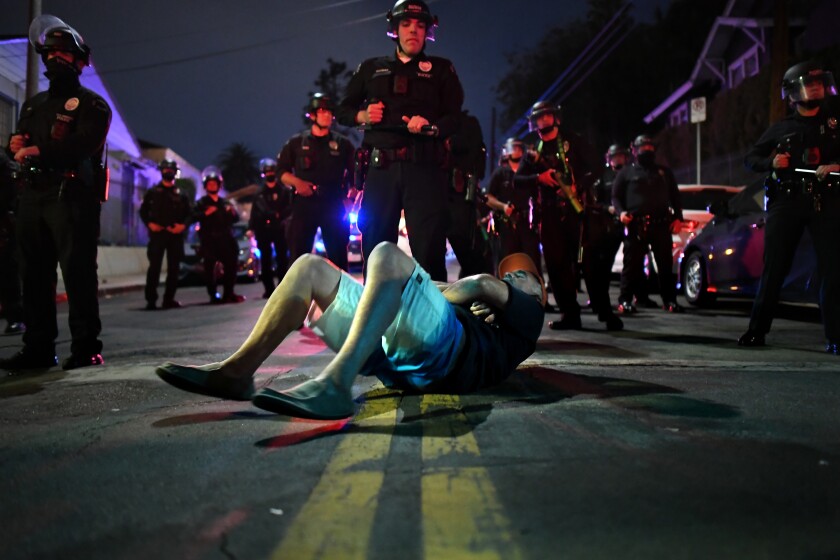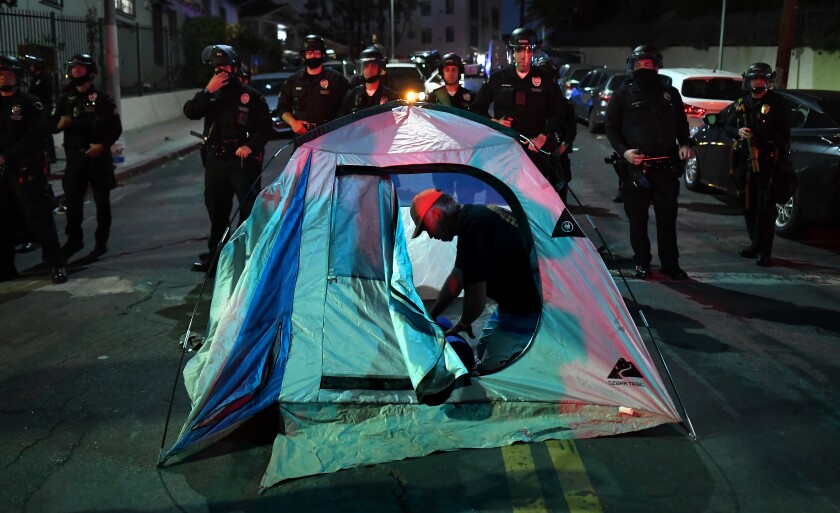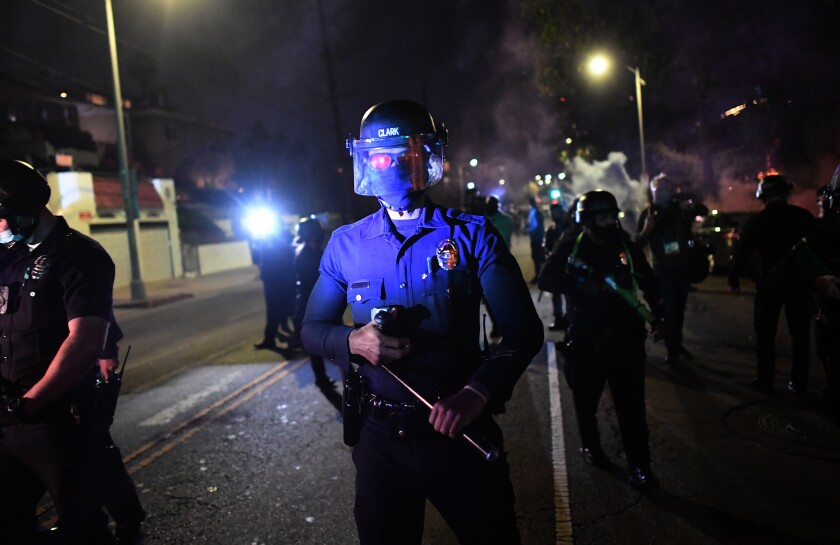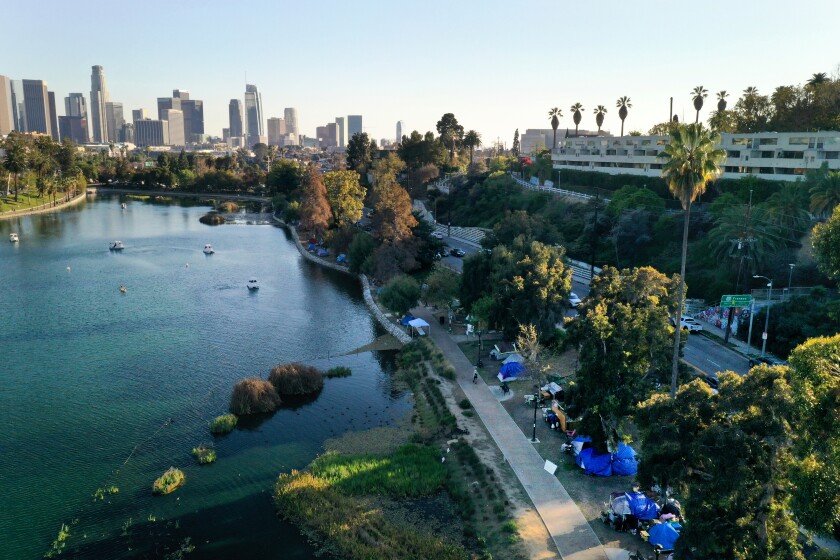Los Angeles officials said they intend to close a homeless encampment at Echo Park on Thursday after a night of protests as workers erected fencing and authorities ordered residents of the camp to clear out.
More than 200 protesters gathered at the park Wednesday night and Thursday morning in a tense standoff with police over the future of the encampment, which has become a flash point in the city’s long homelessness crisis.
The camp has drawn the ire of neighbors, and the city has agreed to move those living in the park to hotels. But some residents say they prefer to stay in the park and argue they have the right to do so.
After nearly 100 people chose to either strike or abandon their tents and accept shelter in downtown hotels, a few dozen homeless campers remained in Echo Park, vowing to resist a massive city effort expected as soon as Thursday to push them out.
Los Angeles police Chief Michel Moore said Wednesday night that homeless residents inside the park would be allowed to remain overnight, but that no one else could enter, and the encampment’s residents must leave within 24 hours.

There was a huge police presence Wednesday night as authorities began the process of closing down the park.
As skirmishes erupted, police were seen shoving some protesters; bottles and other objects were thrown at officers. Protesters chanted, “Whose park? Our park!” and, “Why are you in riot gear? I don’t see no riot here!”
Park rangers, flanked by LAPD officers, began taping notices of closure onto trees and light poles on the east side of the park, where homeless people have been camping throughout the COVID-19 pandemic. The signs said the park would close Thursday and gave notice that all personal property must be removed, “including, but not limited to, tents, chairs, tables, backpacks, bags, and personal items.”

City contractors protected by LAPD officers unloaded fencing from flatbed trucks. Floodlights helped guide their work as they pounded the panels of fence into the ground. Once it was up, the workers unfurled green fabric and hung it along the fence.
On Thursday morning a small number of people woke up inside the fenced park, worrying about what was to come.
“I feel like I’m being detained,” said David Busch-Lilly, who was among more than a dozen people remaining inside the fenced park as dawn broke Thursday. “If I leave, I don’t trust that they’ll let me back in.”
Valerie Zeller likened it to “a hostage situation.”
The homeless woman said she was reluctant to go to the hotel rooms that had been offered to people camping at the park, saying that she had heard that residents would be searched and subjected to confining curfews.
Yellow tape ringed the blocks surrounding the park, where police cruisers blocked people from driving or walking into the area. Inside the fenced park, the morning chatter of birds and geese mingled with the low moan of a helicopter overhead.
Ayman Ahmed, who is living at the park, said that when police told them they could stay until the following night, “we thought it was a victory.”
“Was it a victory?” he asked. “Twenty four hours with a perimeter all around us?”
Another homeless man in a gray cap, who declined to give his name, said that encampment residents are hoping that they will get some kind of legal permission to stay, based on the “shelter in place” guidelines for the COVID-19 pandemic.
He did not want to head to “any government-provided facilities,” saying, “I just don’t like to take anything from the government.”
Still, the man said, “all these hopes we have about intervention from on high are kind of measured.”
“We’re waiting to get busy to jump, if we have to jump,” he said.
Some had already decided to go.
Late Wednesday, Edward Juarez dismantled a tent on the east side of the park as dozens of officers massed across the street. Juarez and others living in the park have to clear out by 10:30 p.m. Thursday, according to posted signs.
LAPD and protesters square off in Echo Park as an imminent city closure draws near.
Juarez, a professional photographer who has lived in the park since August, said the tent belonged to a friend who’d been placed at a hotel in downtown Los Angeles last week. Juarez said he lost his livelihood when the pandemic shut down concerts and other nightlife events he worked. He planned to stay the night somewhere else, maybe on Alvarado Street or at a friend’s house.
“I just want to get out of here, it’s getting crazy,” he said, nodding toward the officers wearing helmets and carrying batons across the street.
Juarez said police came to the park last week and said the city planned to clear the area, although they didn’t tell him when the sweep would happen.
“It’s what it is,” he said. “What else are you going to do?”
As protests erupted on the west side of the park, senior officials with the Los Angeles Homeless Services Authority moved through the park’s dimly lit and dead-quiet eastern edge, seeking out the 30 to 50 homeless people they estimate remain.
They found one couple who jumped at the opportunity to go to a downtown hotel and quickly called them a Lyft.

“Let’s meet at their tent. We have to figure out what to do with their stuff,” LAHSA executive director Heidi Marston said to one of her colleagues as they waited for them to depart.
Marston was angry with how the park’s closure had been rolled out and communicated to homeless people. They needed time and ample warning before something like this could take place, she said.
“It’s about setting expectations, being clear and giving them options,” Marston said. That wasn’t possible here, she said. The couple they got to a hotel were the only people who wanted to go Wednesday night. She hoped more would go Thursday.
“If you’re going to close the park, be clear. It doesn’t mean we need to take people by surprise,” she said. “It facilitates fear, chaos and it breaks the trust we built. It seems like it didn’t need to happen this way.”
A homeless encampment at Echo Park Lake has become a symbolically fraught case study of the rights to public spaces
Over the last year, the encampment had grown to nearly 200 tents and covered nearly half the park, evolving into a commune-like society with a shared pantry, a garden, a veneer of self-policing and a tenuous grasp on basic sanitation. It has divided the surrounding Echo Park community and became a case study of the conflicts arising in neighborhoods across Los Angeles over the rights to public spaces and the competing interests of the housed and unhoused.
Some residents of the surrounding hillsides demanded that the city do something about an intrusion of trash, drug use and crime.
Early Thursday morning, police had the park blocked off and were not allowing anyone in.

Outreach workers have been registering as many people living in the park as possible and taking them to hotels rented by the city for homeless people.
“You define a sweep as moving someone indoors to a safe, clean environment where they will be provided free, healthy meals, receive medical care and a path to wellness, then you can call it what you want,” L.A. City Councilman Mitch O’Farrell said Wednesday. “Because this is what we are doing for everyone who has been there over the last several weeks or months.”
But the SELAH Neighborhood Homeless Coalition late Wednesday demanded the closure be postponed so residents “have the necessary time to meaningfully connect with service providers who are working tirelessly to serve them.”
When Moore announced that no one would be evicted Wednesday night, protesters said they considered it a victory. But more protests are expected Thursday.
Times staff writers James Queally and Kevin Rector contributed to this report.




















